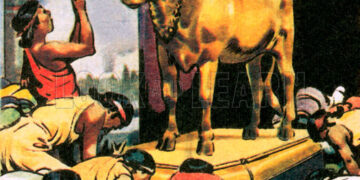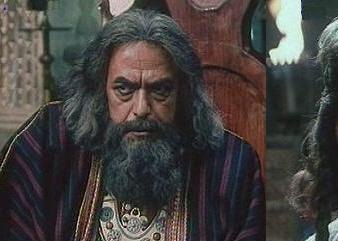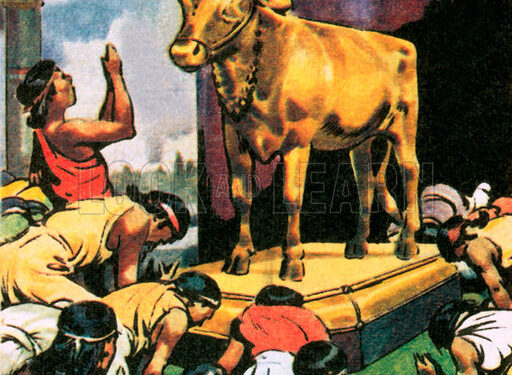Author: Hamed Sarem
The example of the calf worship of the people during the time of Imam Hasan (AS):
The peace treaty of Imam Hasan (AS) is rooted in the ideological corruption of the Muslims who, during the event of Saqifah, instead of choosing an Imam who was knowledgeable and just, chose an ignorant Imam. This inclination of the people towards falsehood is an example of calf worship.
When we look at the lives of humans, truly, great individuals are not few; people who have become legends for their nations. It is possible that due to their legendary status, there has been exaggeration about these individuals, and at times they have even transcended the realm of legend and turned into myths. Much has been spoken and written about these mythical figures.
Summary:
The peace treaty of Imam Hasan (AS) is rooted in the ideological corruption of the Muslims, who, after the event of Saqifah, chose an ignorant leader instead of the knowledgeable and just Imam. This ideological deviation, symbolized as calf-worship, led people to abandon the support of their rightful Imam. Imam Hasan (AS), with knowledge of the situation, made peace as a strategic decision to defeat the enemies and show that those who reject the rightful authority will eventually fall into calf-worship. Ultimately, the just rule of Imam al-Zaman (AS) can only be realized by accepting his leadership, and calf-worshipers will not be able to establish it.
A personality at the pinnacle of existence.
This time, we speak of a personality who stands so high in the expanse of existence that even the praises of others cannot fully reach the essence and ultimate description of him – as stated in Jama’ah al-Kabirah – and there is nothing and no one in this world that God has created who can be compared to this great personality – as mentioned in Ma’ani al-Akhbar. Truly, how can we reach the ultimate description of him or compare him to any ordinary human beings, when he is al-Mujtaba?
God has chosen him and selected him for His guidance, and His will has placed his heart as the vessel of His divine will. It is clear that any wise person, when they look at him with these attributes, cannot help but be compelled by humility and obedience to him; for his will and divine purpose are God’s will, and thus, obeying him is equivalent to obeying God, and his satisfaction is the satisfaction of God.
The will of the Imam is the will of God.
Can this great personality, whose qualities cannot be described even if all the wise men were to gather – as mentioned in Imam Reza’s sermon in Merv – be criticized? Can one ask why he did not draw his sword, why he chose peace, why, and why, and why?
Certainly, whenever any question arises about him, we must not forget that he was sent by God to guide His creation. Therefore, we must align ourselves with him, not expect him to align with us! When this point is considered, the direction of these questions changes. We should seek guidance from his conduct, not search for faults or criticism. And of course, the doubts raised by opponents should not be left unanswered.
The events that took place in the early days of Islam, during the life of Imam Hasan (AS), are very important and significant. However, here, only a very small glimpse of them is mentioned, in the hope that, through it, we may be able to see the path of guidance more clearly.
The outcome of the peace treaty is a sign of Muawiya’s fear and inability.
One of the most significant events was the peace treaty with someone who, according to the words of the Prophet of God, was cursed. This peace agreement has remained a subject of questioning up to this day, and many analysts have offered various interpretations regarding the reasons behind it. Was this peace truly an acceptance of defeat, or was it a strategic move to impose defeat upon the enemy? Although the terms of the peace treaty indicate that Imam Hasan (AS) entered the agreement from a position of strength, the conditions outlined in the treaty reflect the enemy’s weakness and fear.
In a sermon, Imam Hasan (AS) explains that the reason for accepting the peace was the betrayal of the people in failing to follow the divinely appointed Imam. He warns of the dire consequences of turning away from an Imam who has been appointed by God.
The support of Imam al-Zaman brings down blessings upon the people.
Imam Hasan (AS) says: “I swear by God, if the people had pledged allegiance to me, obeyed me, and supported me, the sky would have sent down its rain and the earth would have bestowed its blessings upon them. And you, O Muawiya, would not have harbored any hope for the caliphate.”
This is while the Prophet (PBUH) said: “A nation will never entrust their affairs to someone who is less knowledgeable than the most learned among them, except that their affairs will decline until they reach the state of calf worshipers!” The Children of Israel abandoned Harun (Aaron) and turned to the calf, even though they knew that Harun was the successor of Musa (Moses). Similarly, this nation abandoned Ali (AS) even though they had heard from the Prophet (PBUH) saying: “You are to me as Harun was to Musa, except that there is no prophethood after me.”
The ideological deviation that led to the peace.
In this sermon, the Imam refers to the great ideological deviation that occurred among the people, and perhaps this statement of the Imam provides the best answer to the question of why the people withdrew their support from their Imam of the time. Why did the people of Kufa, despite their knowledge of Muawiya’s corruption and treachery, support him due to their worldly desires?
The love for the calf in the hearts of the oath-breakers.
Yes, according to the words of Imam Hasan al-Mujtaba, this deviation had its roots in the beliefs of the people. The soldiers, before being deceived by the gold and silver of Muawiya, had already fallen into corruption in their beliefs, and this corruption stemmed from the event of Saqifah, where the rightful Imam was sidelined, and instead of pledging allegiance to the knowledgeable, they pledged allegiance to the ignorant.
It is no surprise that someone whose heart harbors the love of the calf and worships the calf will never rush to support God and the Caliph of God. In light of the Qur’anic verses, Imam al-Mujtaba reveals to us some of the secrets of the Qur’an. This is God’s tradition: whenever we refuse to accept the rightful authority of the Imam, we are certainly under the authority of the calf and have become calf worshipers, just as the people of Musa (AS) rejected the authority of Harun, who was divinely appointed, and ultimately became calf worshipers.
Tearing of the shroud.
Imam Hasan (AS), with the knowledge of his Imamate, knew what insults his enemies would commit during his funeral procession. He knew that they would so brutally attack his pure body, to the point that even his shroud would be torn apart – as mentioned in the Ziyarat al-Jama’ah of the Imams of the believers. However, through this funeral procession and the audacity of the enemies, the example of calf worship in this Ummah became evident, so that the path of guidance and God-worship would be clearly separated from the path of misguidance and calf worship.
“The just rule of Imam al-Zaman will not be realized by the calf-worshipers.”
Since the Qur’an was revealed for all times, we must be aware that the just rule of Imam al-Zaman (AS) will not be realized by those who, in the words of the Qur’an, have become calf-worshipers. We must remind ourselves that in our political, social, and other aspects of life, we are either under the leadership of Imam al-Zaman or we risk falling into the same deviation that the people of Prophet Musa (AS) faced.











